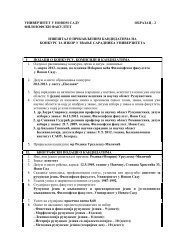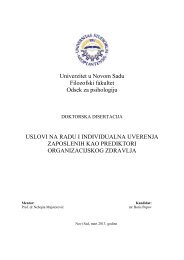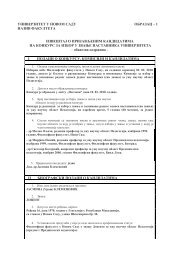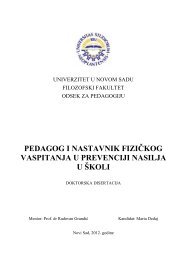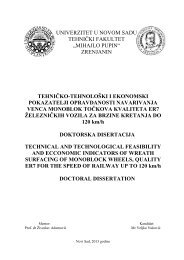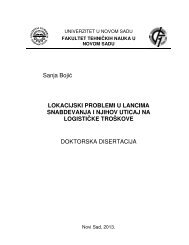Intercultural competence as an aspect of the communicative ...
Intercultural competence as an aspect of the communicative ...
Intercultural competence as an aspect of the communicative ...
Create successful ePaper yourself
Turn your PDF publications into a flip-book with our unique Google optimized e-Paper software.
prevent students from gaining true intercultural <strong>competence</strong>. Finally, Jur<strong>as</strong>ek (1995),<br />
Robinson-Stuart <strong>an</strong>d Nocon (1996) claim that <strong>the</strong> only learning that c<strong>an</strong> take place in <strong>the</strong><br />
cl<strong>as</strong>sroom will be along <strong>the</strong> cognitive lines, <strong>an</strong>d that it will be only ‘cognitive boundary<br />
crossing’ (Robinson-Stuart, Nocon 1996: 43) without <strong>an</strong>y reflection on learners’ attitudes.<br />
Some authors, like Herzog (2003) for example, claim that ICC must be b<strong>as</strong>ed in a<br />
particular knowledge <strong>of</strong> one culture. Herzog believes that generalised intercultural<br />
<strong>competence</strong> is a just <strong>as</strong> hollow a concept <strong>as</strong> non-specific foreign l<strong>an</strong>guage <strong>competence</strong>.<br />
Such views would <strong>the</strong>n equate ICC with <strong>an</strong>d narrow it down to specific cultural<br />
<strong>competence</strong>, <strong>an</strong>d would be in a contr<strong>as</strong>t to observations that individuals who have<br />
experienced foreign environments would be better equipped to navigate through o<strong>the</strong>r<br />
unfamiliar situations (<strong>as</strong> cited in Rathje 2007).<br />
DeVoss et al. (2002) <strong>of</strong>fer a discussion on possible challenges that teaching<br />
intercultural <strong>competence</strong> may face. These are: focusing on <strong>the</strong> characteristics <strong>of</strong> students’<br />
own cultures, replacing notions <strong>of</strong> cultural stereotypes (positive <strong>an</strong>d negative) with more<br />
fluid, dynamic underst<strong>an</strong>dings <strong>of</strong> tendencies, avoiding limiting <strong>the</strong> guidelines for good<br />
intercultural communication to guidelines for good technical communication in general,<br />
developing a more sophisticated sense <strong>of</strong> <strong>the</strong> design considerations necessary for<br />
intercultural communication, encouraging students to move intercultural communication<br />
beyond <strong>the</strong> cl<strong>as</strong>sroom (p. 76).<br />
Ano<strong>the</strong>r challenge is <strong>the</strong> age <strong>of</strong> learners when <strong>the</strong>y are ready to be engaged in<br />
intercultural training so that <strong>the</strong>y benefit from it. Byram et al. (1994) <strong>an</strong>alysed available<br />
research <strong>an</strong>d concluded that while learners differ in <strong>the</strong>ir ability to mediate between<br />
cultures <strong>an</strong>d decentre from <strong>the</strong>ir own <strong>an</strong>d feel empathy with o<strong>the</strong>rs, teenage years – from<br />
12 years <strong>an</strong>d older, are <strong>the</strong> years when it c<strong>an</strong> be expected that learners c<strong>an</strong> do t<strong>as</strong>ks that<br />
involve intercultural issues.<br />
It is impossible to equip students with all possible intercultural <strong>competence</strong> that<br />
would l<strong>as</strong>t <strong>the</strong>m a lifetime. Therefore, <strong>the</strong> acquisition <strong>of</strong> ICC is never complete <strong>as</strong> it is not<br />
possible to <strong>an</strong>ticipate all <strong>the</strong> situations in which a learner would need it which makes ICC<br />
a life-long activity. This is in keeping with <strong>the</strong> current idea <strong>of</strong> life-long learning – that<br />
academia does not give students knowledge that will l<strong>as</strong>t <strong>the</strong>m all working life, but<br />
equips <strong>the</strong>m with necessary skills with which <strong>the</strong>y will keep acquiring new knowledge<br />
<strong>an</strong>d <strong>competence</strong>s.<br />
Finally, <strong>an</strong>d perhaps most import<strong>an</strong>tly, <strong>the</strong> criticism against ICC teaching goes<br />
against a considerable difficulty <strong>of</strong> <strong>as</strong>sessing it, <strong>as</strong> learning <strong>an</strong>d teaching ICC is a fairly<br />
66





